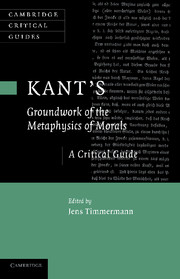Book contents
- Frontmatter
- Contents
- List of contributors
- List of translations and abbreviations
- Introduction
- 1 Ethics and anthropology in the development of Kant's moral philosophy
- 2 Happiness in the Groundwork
- 3 Acting from duty: inclination, reason and moral worth
- 4 Making the law visible: the role of examples in Kant's ethics
- 5 The moral law as causal law
- 6 Dignity and the formula of humanity
- 7 Kant's kingdom of ends: metaphysical, not political
- 8 Kant against the ‘spurious principles of morality’
- 9 Autonomy and impartiality: Groundwork III
- 10 Problems with freedom: Kant's argument in Groundwork III and its subsequent emendations
- 11 Freedom and reason in Groundwork III
- Bibliography
- Index
6 - Dignity and the formula of humanity
Published online by Cambridge University Press: 04 August 2010
- Frontmatter
- Contents
- List of contributors
- List of translations and abbreviations
- Introduction
- 1 Ethics and anthropology in the development of Kant's moral philosophy
- 2 Happiness in the Groundwork
- 3 Acting from duty: inclination, reason and moral worth
- 4 Making the law visible: the role of examples in Kant's ethics
- 5 The moral law as causal law
- 6 Dignity and the formula of humanity
- 7 Kant's kingdom of ends: metaphysical, not political
- 8 Kant against the ‘spurious principles of morality’
- 9 Autonomy and impartiality: Groundwork III
- 10 Problems with freedom: Kant's argument in Groundwork III and its subsequent emendations
- 11 Freedom and reason in Groundwork III
- Bibliography
- Index
Summary
INTRODUCTION
It is central to Kant's moral philosophy that one should always treat other human beings with respect. He articulates this requirement in his formula of humanity as an end-in-itself, which he calls the supreme limiting condition of one's freedom: ‘So act that you use humanity, whether in your own person or in the person of any other, always at the same time as an end, never merely as a means.’ (G IV 429, cf. IV 430 ff.) However, the exact reason why one should respect others remains a matter of debate. The standard view in the Kant literature is that one should respect others because of an absolute inner worth or value all human beings possess. The absolute value is often called ‘dignity’, and dignity is said to be the reason why one should respect others. The debate focuses on the question whether human beings have this value or dignity in virtue of a pre-moral capacity they have (such as freedom or the capacity to set ends), or because of a morally good will. Against the standard view I shall argue that Kant does not ground the requirement to respect others on any value at all. Rather, one should respect others because it is commanded by the categorical imperative. While this claim is not novel, what is new is my argument that the formula of humanity passage (G IV 427–9) supports this claim.
- Type
- Chapter
- Information
- Kant's 'Groundwork of the Metaphysics of Morals'A Critical Guide, pp. 102 - 118Publisher: Cambridge University PressPrint publication year: 2009
- 4
- Cited by

